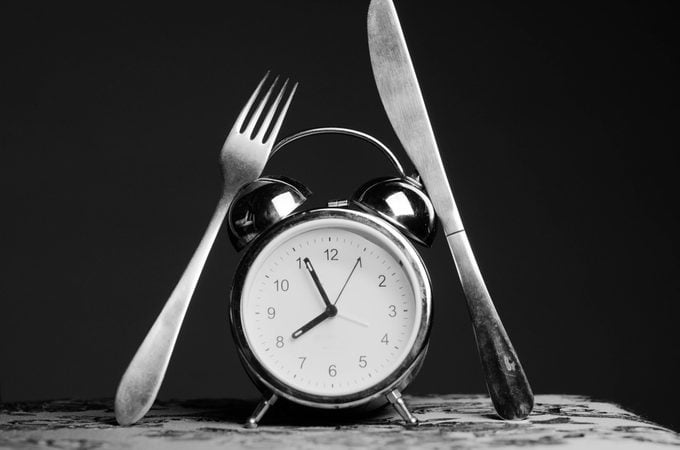What Is the OMAD Diet—and What It Really Does to Your Body
Updated: Oct. 13, 2020
Could you survive on this extreme fasting diet?

Dieting trends come and go, but one that’s seemingly here to stay is intermittent fasting. A new, bigger, badder, and more extreme fasting approach is the OMAD, or one meal a day, diet. The OMAD diet is exactly what it sounds like—people only eat one meal per day. The protocol is you must eat in the same four-hour window on a standard-sized dinner plate every day. The food can only pile up to three inches high, but no foods are off limits.
This extreme form of fasting is just another way to restrict calories, according to Alyssa Pike, RD, the Nutrition Communications Coordinator for the International Food Information Council Foundation. “The OMAD diet is theorized to work for weight loss because if you’re only able to eat once per day, it’s assumed that you won’t be able to eat as much as if you’re eating multiple times throughout the day.” This is what being healthy will look and feel like in 2020.
The concept is simple enough—eating fewer meals could create a calorie deficit resulting in weight loss. Both Malina Malkani, MS, RDN, CDN, media spokesperson for the Academy of Nutrition and Dietetics and Pike agree, however, that the OMAD diet could have negative consequences for your body. One glaring issue is that restricting your food means you’re limiting the variety and amount of vitamins and nutrients you eat, Malkani says. Nutritional deficiencies could lead to a medley of health issues like digestion problems, skin disorders, and even dementia, among others, Healthline reports. As with any other calorie restricting diet, eating less also means your body will have less energy resulting in a slow, sluggish feeling.
The longer-term consequences of the OMAD diet are harder to say since there is little to no research on it, Pike adds. One likely result is the body will compensate for the lack of consistent food by slowing down your metabolism, and you’ll more than likely regain any weight you lost. “Sure, this diet might lead to short-term weight loss, but what happens when you begin to eat normally again,” Pike says. “A diet that advocates for extreme restriction or control of one’s eating habits isn’t sustainable long-term or beneficial for your mental health.” This is what it’s really like to try intermittent fasting.
The mental health aspect is a key reason why Malkani and Pike don’t advocate for such restrictive fad dieting. These harsh rules make it more likely for people to foster an unhealthy focus on and relationship with food, Malkani, creator of the Wholitarian lifestyle, says. Fans of the OMAD diet claim eating once per day leads to the opposite—improved focus and “diet freedom,” Pike says. Since no foods are off limits, people think they’ll be more satisfied with their diet even if they only get to eat once a day. But Pike finds it hard to believe someone eating only once a day won’t also be preoccupied with or thinking about food for most of the day. This could lead to making poor food choices when the time finally does come to eat. Research shows that fasting increases the risk binge eating which is linked to a whole host of psychological and physical health issues.
Intermittent fasting, however, is a bit of a different story. Still-emerging research shows intermittent fasting could lead to weight loss, better blood sugar regulation, and some chronic disease prevention, Malkani says. Unlike the OMAD diet, the typical intermittent fasting diet requires 16 hours of fasting and 8 hours of eating, making it less extreme. “It offers a more sensible and balanced approach which means there is less likelihood of potential negative effects,” Malkani says. Excluding people who fast for religious reasons, Pike doesn’t advocate for any fasting diets since they often intensify thoughts peoples’ food and effectively damage their relationship with food, Pike says. Here’s the healthy diet plan nutritionists use to lose weight.
Although the OMAD diet could work for weight loss in the short term, it will more than likely lead to a preoccupation with food, poor nutrition, and eventually regaining any lost weight. It’s more beneficial to find a healthy, sustainable eating approach that you enjoy. Next, check out the 59 rampant health myths that need to die.
